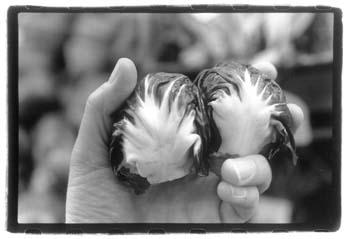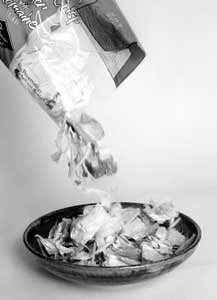Now Lettuce Pray
Handy Salads: Health officials' concerns about food safety have moved into the produce section, as Americans learn to eat more fresh vegetables.
Recent outbreaks of salmonella and Mad Cow Disease have led a lot of people to eat more fresh greens. But even the vegetables in our salads may be tainted.
By Sue Fishkoff
FIRST, THERE WAS salmonella. We scrubbed our cutting boards and grew wary of raw chicken. Then there was Mad Cow Disease and the E. coli scare, so we started grilling our burgers to a crisp. There's always been botulism, so we stay away from bulging cans. And every kid knows you don't order pork medium-rare. But lettuce? What could be healthier than a nice big bowl of California greens?
Now a mass outbreak of E. coli bacteria, which felled 61 people back East in the summer of 1996, has been traced to dirty lettuce from a small farm in Hollister. Fancy Cutt Farms faces civil and criminal charges for violating food-safety laws by processing lettuce in unsanitary conditions that could lead to bacterial contamination.
According to health authorities, the company was rinsing lettuce in dirty, bacteria-laden water, in a shed 100 feet away from a cattle pen, right in the path of dust-borne manure. Great. Just when we thought it was safe to sit down to our salad.
Back in the 1950s, most fresh produce came from a local grower who picked it and delivered it to the corner grocer's. Since then, our food supply has gone global. Produce is shipped from halfway around the world, handled by many unseen people, passing through numerous points of potential contamination all along the way.
We also have seen the emergence of deadly new organisms, including E. coli 0157, the bacterial strain fingered as the culprit in this case. These new, highly toxic organisms are very common in livestock herds and poultry, according to health officials, who fear outbreaks of debilitating and fatal disease.
This new variety of E. coli first began to appear in 1980. Since then, according to the Centers for Disease Control and Prevention (CDC), it has infected more than 20,000 Americans a year. Five hundred of those people die. Others suffer blood and kidney disorders that can cause permanent damage.
The majority of cases involve infected meat or poultry. But increasingly, E. coli and other deadly bacteria are showing up in fresh fruits and vegetables, the kinds of food health-conscious Americans are eating more of, more often.
It's not that the fresh produce itself is dangerous. The E. coli bacteria breeds in animal or bird manure, which can come into contact with fresh produce in the field or during the packing or shipping process. That's what probably happened in the Hollister case.
In June 1996, federal and state health investigators examining E. coli outbreaks in New York, Connecticut and Illinois traced the organism back to Fancy Cutt Farms. That July, inspectors turned up at Fancy Cutt and discovered what they said were appallingly unsanitary conditions.
According to the Food and Drug Administration (FDA) investigators' report, the lettuce was grown in the same field where cows grazed--and deposited their manure. The lettuce was then carted into the company's packing shed in dirty boxes. Employees rinsed the leaves in water that was not properly recycled and that contained another strain of E. coli.
The report states that Fancy Cutt had "no quality-control procedures." Last month--a year and a half after the violations were discovered--the state of California filed a civil suit against Fancy Cutt. The company was arraigned last week on criminal charges filed by the San Benito County district attorney's office.
But Fancy Cutt is still in operation. San Benito County DA Harry Damkar, who filed the criminal case against the farm, says as far as he knows, no injunction has been filed to stop Fancy Cutt from operating because there was not enough legal evidence to link the farm to the illnesses.
Jim Waddell, food safety director in the state's department of health, whose department took part in the Fancy Cutt inspection, says that while investigators were at the site, they also examined conditions at the adjacent Specialty Produce Farm. "It was even worse over there," Waddell says.
Specialty Produce has been slapped with a civil suit by the state and was arraigned Feb. 19, along with Fancy Cutt Farms, on similar criminal charges, plus other charges related to improper state registration.
Like Fancy Cutt, Specialty Produce is still doing business. Both companies are still growing, packing and selling lettuce.
Through the Cracks
THIS LATEST FOOD-SAFETY crisis is, to a large extent, consumer-driven. Increased public demand for fresh fruits and vegetables, and the growing popularity of ready-to-eat packaged salad mixes and fresh juices, has encouraged many small companies to enter an increasingly competitive field.
In particular, small-scale farmers who used to just grow lettuce and radishes have now started cleaning, chopping and processing their own salad mixes. Some of them, health authorities charge, have little understanding of correct safety procedures and/or little incentive to implement them. And because most of this produce is eaten raw, high-heat techniques to kill bacteria such as boiling or pasteurization are not applicable.
Scrupulous cleanliness at every step of the operation, from harvesting through processing, becomes paramount.
"These little startups just get going," says San Benito County agricultural commissioner Mark Tognazzini. "Maybe the guy worked for someone else and says, 'Hey, I can do this.' So he puts a horse trough in the barn to wash the lettuce and goes into business."
A recent New York Times article on the Hollister case quoted federal health authorities warning that we could soon see major outbreaks of food-borne disease emanating from the fresh-produce industry, particularly small farms such as those proliferating in California.
Local health officials are calling for regulations but also for better education for small growers. The worst food-safety problems, they say, occur when regulations are nonexistent or ignored. The small growers proliferating in the premixed salad market often neglect to register with the proper state authorities, they say. Two of the three criminal charges Specialty Produce faces have to do with improper registration.
Another serious health hazard concerns the cleanliness of shipping trucks, which is also not regulated. Trucks used to transport poultry from farm to market one day can be used to ship fresh vegetables the next day, and no law says how that truck must be cleaned. "There's an assumption that if fresh produce is contaminated, that contamination got into it during the processing," Tognazzini says. "And that's just not true."
He tells of a truck that showed up at one local farm to ship fresh produce while it was still filled with chicken blood from a previous delivery. "Sometimes hamburger meat can be stored on a shelf above lettuce in the truck," Tognazzini points out. "There are many possible sources of bacterial contamination."
Critics, however, have focused attention on the nation's health-inspection process, which has been called insufficient to meet the growing food-safety crisis. The FDA has only 700 inspectors to cover 53,000 food-processing companies, meaning that each company can only be inspected once every 10 years. Inspectors are usually only called out in response to a specific disease outbreak.
Perhaps in answer to that criticism, California is beefing up its inspection schedule. The state department of health will send inspection teams out sometime this spring. Waddell says they'll be focusing on fieldworker cleanliness.
"It's a real risk," he says. "Especially with the smaller growers, fieldworkers involved in the actual harvesting then physically put the produce in the bags. It's a direct avenue for contamination."
Nuclear Salads
BEFORE WE THROW out our oil-and-vinegar cruets, the problem should be looked at in perspective. True, CDC reports note an upswing in the number of food-borne illnesses traceable to fresh produce. But the numbers are still infinitesimal. To drag out an old aphorism, you're more likely to be struck dead by lightning than felled by a feces-speckled lettuce leaf.
"Fresh produce grown in California is the safest in the world," says Waddell. "Our recommendation is still the consumption of five portions of fresh fruit and vegetables every day."
Despite their differences on other subjects, California health authorities and growers come together in supporting Waddell's assessment. The agriculture industry is working hard, growers say, to reduce an already tiny danger to microscopic proportions.
California's field-sanitation regulations set the industry standard, notes Walter Wong of the Monterey Health Department. And food-safety guidelines developed last year by the Irvine-based Western Growers Association were cribbed unashamedly by the Clinton administration as the basis for proposed federal food-safety guidelines expected to be released by October.
Much of the responsibility for food safety rests with the consumer, experts agree. Growers are quick to point to CDC figures claiming that just 3 percent of food-borne illnesses are traceable to the farm. They say the other 97 percent is traceable to contamination that occurs after the product leaves the field, most likely in a restaurant or a consumer's home.
Even given that statistics on food-borne illnesses are underreported and skewed in favor of large-scale outbreaks, these figures still show that blame can't be put entirely on the farmer.
"Wash all produce before consumption, in good, running water," Waddell advises. That includes salad mixes, even those marked "triple-washed," whether they are purchased in a pre-packed bag or in loose form from a supermarket shelf or at a farmer's market.
Another way to reduce the risk of food-borne disease would be for producers to adopt certain processing techniques designed to wipe out bacteria, such as irradiation. This technique, however, is unacceptable to organic growers on ideological grounds and to conventional growers on practical grounds.
"Irradiation is contrary to organic-industry protocol," says Bob Snowcroft, executive director of the Santa Cruz-based Organic Farming Research Foundation. "There's a lot of concern about the lack of research around [irradiation] and what it does to live foods."
Teresa Thorne, communications director for the California Strawberry Commission, points out that there aren't any irradiation facilities for fresh produce in California, anyway. The nearest ones are in Florida. "Can you imagine shipping all our produce to Florida for irradiation?" she asks.
[ San Jose | Metroactive Central | Archives ]
Copyright © Metro Publishing Inc. Maintained by Boulevards New Media.
![]()

Richard Pitnick Bowling Greens: Pre-cut salad mixes still need to be washed, officials say.
Bowling Greens: Pre-cut salad mixes still need to be washed, officials say.
From the February 26-March 4, 1998 issue of Metro.
![[Metroactive News&Issues]](/gifs/news468.gif)